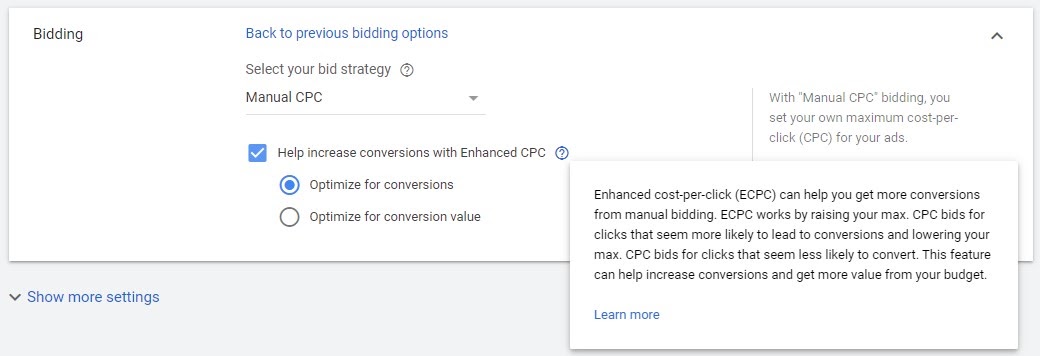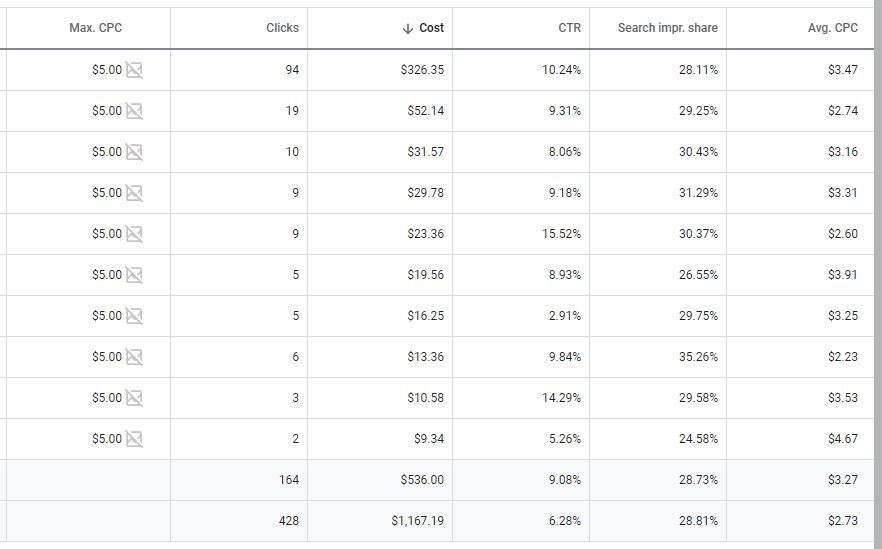Google is trending towards automation. This trend includes bidding strategies, despite many advertisers stubbornly clinging to Manual CPC. The burning question: can manual campaigns benefit from switching to an Enhanced CPC (ECPC) bidding strategy?

We’re about to tell ya.
For the many marketers who spend 80% of their time optimizing their accounts with low-value, manual tasks, we think an automatic strategy could help.
Ultimately, a good experience with ECPC depends on your business, your unique needs and goals, and the bidding strategy you already have in place.
So if you’re not sure about automatic bidding or are thinking about switching to enhanced CPC, read on. We explore how ECPC works, how it performed for our client, and whether you could benefit from the strategy, too.
What is Enhanced Cost Per Click (ECPC)?
Enhanced Cost Per Click (ECPC) is a semi-automatic bidding strategy that uses a cost-per-click (CPC) bidding structure. With any CPC bidding, the objective is to drive traffic to your website through clicks. As the name suggests, you’ll only pay Google when a user clicks on your ad.

You have the option to layer Enhanced CPC for a Manual CPC campaign.
ECPC will automatically adjust your bids to try and get as many conversions as possible within the budget you set for the campaign. In other words, take the smartest Google ad bidder you know and assign them to adjust your bids in real-time to give you the best outcome possible. But how does it work?
How does Enhanced CPC Bidding Work?
Like other automated bidding options, ECPC raises and lowers bids based on real-time cues from each Google ads auction. This particular bidding algorithm uses several data types to predict how likely each click will result in a conversion. If it thinks the likelihood is high, it raises the bid for that auction.

Flanders senses a click likely to result in a conversion.
Google accounts for several factors to determine when to raise or lower bids. For example, user device and location data, various demographic information, and other “contextual signals.” Essentially, ECPC watches your bidding and increases your max bid on ads that should help you achieve your campaign goal.
But how much will it increase your bid? It used to be up to 30% above your Max CPC. However, Google removed the cap in 2017 to account for variations in conversion rates across dimensions like audience or location.
Without the safety net that a Max CPC provides, advertisers will want to monitor the raised bids to make sure their budget isn’t eaten up too quickly. At the same time, ECPC will also lower individual costs per click.
In other words, the algorithm will lower bids for ads that are unlikely to result in a conversion. How low will it go? For some ads, it will reduce your bid to $0. You won’t spend a dime on ads that Google thinks won’t work.
Note: Remember that performance is relative to Google. Machine learning may not always assess performance (in this case, likelihood of a conversion) accurately. As a result, you may not bid on ads that could do well if you were bidding manual. We’ll cover a few ways to reduce this likelihood later.
So how does ECPC compare to Manual CPC?
Enhanced CPC vs. Manual CPC
So you get how Enhanced CPC works, but how does it compare to its manual counterpart?
With Manual CPC, you set your maximum cost-per-click (i.e., max CPC); regardless of how it performs, Google cannot bid above that set amount.
Of course, you’ll have to stay on top of your ads to observe performance and adjust your bids accordingly (it gets tedious). But your max bid will be your max bid, and you more directly control your marketing budget.
In comparison, ECPC is like Manual CPC…with a little spice. Google will “try” to keep your average CPC bid below the max bid you set on manual, but will raise the price if it thinks it will benefit you. It is not unusual for brands using Enhanced CPC to see their ad budgets go up and significantly.
So what does this mean in practice?

Initiative can’t beat results.
Let’s say you sell ski boots online, and you are targeting amateur skiers. For example’s sake, you set your max CPC bid to $1 and choose ECPC. However, in an auction, Google thinks a click will earn you a conversion, and the minimum bid is $1.25. Google raises your bid above your maximum and bids $1.30 to make you more competitive in that auction.
In this scenario, you get more clicks, a better conversion rate than with other ads, and ultimately make more money. However, you also increased your bid spend and assume there are auctions where Google lowered your CPC, achieving your average CPC. Depending on the number of clicks and the conversion rate, you could have just eaten into your profit margin significantly.
So, without a bidding cap, is ECPC better or worse?
Enhanced CPC and ROI
The lack of a bidding cap concerns some advertisers, but whether that makes ECPC a detriment depends on your return on investment (ROI). While ECPC may increase your CPC on some keywords, we don’t think that should be a barrier to you trying it out.
Luckily, ECPC is a “conversion-focused” bidding strategy. You just need to make sure those conversions are worth more to your business than what you spent on the campaign.

Conversions can be of unequal value. Calculate ROI to see the true campaign value.
Let’s consider the ski boot example above. If the visitor sees your ad, clicks to your site, and not only purchases that one pair of boots, but several for the whole family, you’ve covered the additional ad spend and then some.
Keep in mind that Google will most often increase bids to create more visibility and link clicks, which does not always translate to more revenue. For example, lead generation companies that optimize for conversions (say, filling out a form) may convert fewer leads than expected. Factor in conversion rates to get a fuller picture of how ECPC is performing. It isn’t a “set it and forget it” strategy.
Case study: Our Results
But enough of the theoretical. We were curious about how an ECPC campaign would compare to one running on Manual for a local attraction business and client over two months. While a few of us were skeptical, ECPC came out as the clear winner.
Here’s how the campaign ran for manual:

Manual CPC campaign results.
Versus Enhanced CPC:

ECPC campaign results.
Most notable benefits of using ECPC vs. Manual CPC:
- ECPC decreased cost per click by 48% (from $3.27 to $1.58)
- ECPC increased CTR by 33% (from 6.28% to 8.34%)
- ECPC also appears to have lowered overall search impression share by roughly 22% (from 28.81% to 22.6%).
While we could perceive the reduction in search impression share as a negative result, we believe it indicates some smart bidding magic. In other words, the new impression share is likely because Google avoided expensive clicks that weren’t likely to convert. Overall, with a decrease cost per click, increased CTR, and a potential improvement in click quality, we’ll be using ECPC for this account going forward.
When to Use Enhanced CPC
Using a smart bidding strategy at the right time is more important than the fancy algorithm itself.
So let’s cover a few factors that impact success using Enhanced CPC:
- Age: Smart bidding needs data to make correct decisions. An older account with historical data tells Google’s AI a lot more than a Google Ads newbie can.
- Clicks: Another aspect of data is the number of clicks. Google says you need at least 15 conversions and 15 clicks per month before you press play on automated bidding.
- Budget: You don’t need an enormous budget, but no penny pinching either. A general rule is to set a daily budget equal to your average cost per acquisition.
- Conversion Tracking: You must have conversion tracking enabled to used ECPC bidding. Regardless of whether you’re using ECPC, I really must insist you set this up anyway (or enlist us to help you… your ad performance will thank you)
- Campaign Goal: Are you focused on increasing visibility, clicks, or conversions? ECPC is useful if you want to set a bid yourself but want some automated bidding magic to optimize conversion-generating clicks. If all you want visibility, move along.
- Google Ads Strategy: If you’re going to use a smart bidding campaign, get a clear picture of your company’s performance goals and budget. How does a conversions-focused campaign fit your larger Google Ads strategy?
- Time: Your greatest resource. Which unfortunately could be sucked up by manual activities. Try ECPC if you meet the above criteria and want to spend your time more effectively.
All advertisers know the pain of manual PPC work. For instance, you may require a complex bidding strategy, and optimization can be tedious or messy. So if you have (or can create) the data and budget, why are you waiting? Start testing.
The Pros and Cons of Enhanced CPC
Still not convinced? We feel you — of course you want to make sure this strategy is right for your business. Let’s weigh the pros and cons of ECPC.

Have to test it out first.
Pros:
- ECPC lets you control initial bidding but also benefit from machine learning and automated bidding.
- If conversions are your goal, ECPC may automatically reduce bids on poor-quality clicks.
- Performance improves over time as you collect more data. Past campaigns inform current ones.
- You can use the time once spent on manual activities in more valuable ways.
Cons:
- You give Google access to and control over your account and the bidding for the ECPC campaigns you run.
- You need to set up Conversion tracking properly. Otherwise, Google will not optimize your ads correctly, and your conversion rates may suffer.
- Since Google optimizes ads that will perform well, you may exceed your max CPC, sometimes by large percentages.
The Future of ECPC
The bottom line? ECPC keeps getting better and better. Google keeps improving its algorithms, and machine learning is advancing.

It’s ok. Google will build one for you.
Ultimately, the more campaign data and history you have with Google Ads, the more likely ECPC will “get it right” for you. It’s the perfect medium between Manual CPC and other bidding strategies — you can see incremental increases in conversions but still have some control over keyword bids.
Google only suggests manual campaigns for businesses that see less than 15 conversions a month or need complete spending control for views, clicks, or conversions.
In conclusion, start testing Automated bidding now. It will probably be more effective, and perhaps the only bidding type, in years to come.
Ariana Killpack
Director of Content
Ariana prides herself on always learning everything there is to know about pay-per-click advertising and conversion rate optimization, which is why she can create such excellent content. When she’s not writing fantastic content, you can find her hiking, swimming, or baking bread.
Leave us a comment.
Subscribe to our blog
Subscribe to our blog
Get weekly PPC & CRO advice sent straight to your inbox.